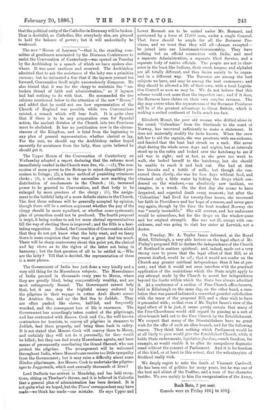On Tuesday, Mr. A. Taylor Innes delivered, at the Royal
Hotel, Edinburgh, a very able lecture on the legal effect of Mr. Finlay's proposed Bill to declare the independence of the Church of Scotland in matters spiritual ; and, indeed, made out a very strong case to prove that the legal effect of that Bill, as at present drafted, would be nil ; that it would not confer on the Church any greater spiritual independence than it has at pre- sent; and that it would not even interfere with the practical application of the restrictions which the State might apply to any attempt made by the Church to assert her independence beyond the limits within which the State has always admitted it. At a conference of a section of Free Church office-bearers, held in Edinburgh on the same day, on the other hand, a reso- lution that was passed indicated a somewhat guarded satisfaction with the tenor of the proposed Bill, and a clear wish to have it proceeded with ; so that even if Mr. Taylor Innes's view of the legal effect of it be just, it seems pretty certain that many of the Free-Churchmen would still regard its passing as a sort of olive-branch held out to the Free Church by the Establishment. We suspect that many of the Disestablishers have no great wish for the offer of such an olive-branch, and for the following reason. They think that nothing which Parliament would be at all likely to pass would give the Established Church, while it holds State endowments, legislative freedom,—such freedom, for example, as would enable it to alter its compulsory dogmatic creed without the consent of Parliament. And it is for freedom of this kind, or at least to this extent, that the voluntaryists of Scotland really wish.


































 Previous page
Previous page